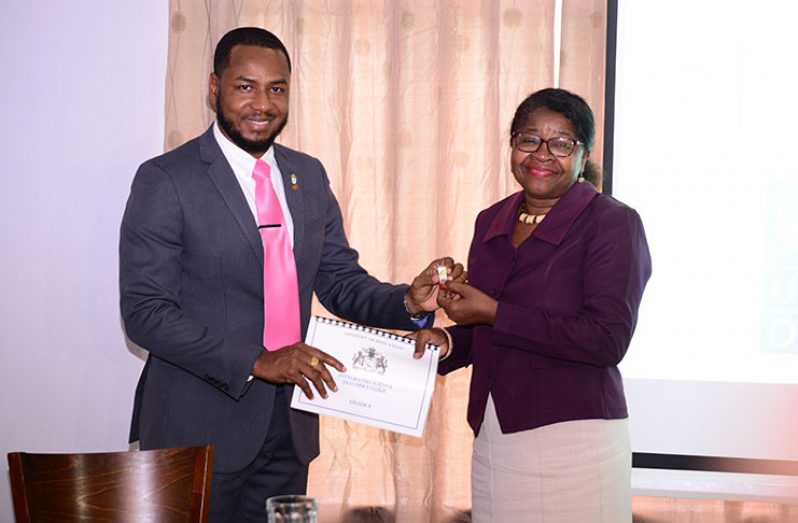…Environment Department submits ‘modified curriculum guides’ for NCERD’s consideration
THE Department of Environment has submitted ‘modified curriculum guides’ to the National Centre for Educational Resource Development (NCERD) for its consideration.
The guides that are in keeping with Guyana’s Green State Development Strategy (GSDS) and the Rio Mainstreaming Project cover a wide range of topics including Climate Change, Biodiversity, Land Geology and Geography, Agriculture and Forestry. These areas were further broken down across the Social Studies, Primary Science or Integrated Science, and Language Arts or English Language curricula for Grades One-Nine.
The proposed ‘Modified Curriculum Guides’ were presented to NCERD Director Jennifer Cumberbatch by the Department of Environment’s Environmental Policy and Education Coordinator, Alvin Doris at the Herdmanston Lodge on Wednesday.
Ahead of handing over the guides to the NCERD Director, Doris explained that the Department of Environment, last October, established a multi-agency working group that was tasked with reviewing the Education Ministry’s curriculum guides for Grades One through Nine. He noted that the intention was to establish whether there was comprehensive environmental coverage in the schools’ curriculum. “As you can imagine, there was little to none because our schools’ curriculum had not been revised, in part, for decades,” Doris said.
The Environmental Policy and Education Coordinator said, given the reality, the Department of Environment thought it fitting to contribute to the Guyana Education Sector Improvement Project which entails curriculum reform.
“We saw that the lack of environmental coverage provided us a great opportunity to propose what could be enforced,” Doris said, noting that the working team focused on “infusion” rather than the introduction of new topics. “Where ever we found that there was opportunity for an organic fit of what we proposed, we put it in,” he added.
Onika Stellingburg, the department’s Stakeholder Management Coordinator, said education forms a key part of the government’s Green State Development Strategy: Vision 2040 and the proposed guidelines were aligned with the 20-year green economic plan.
She explained that, under thematic area ‘G’ – Healthy, Educated and Socially Cohesive Population – there are a number of key priority actions for the education sector.
One such action is the implementation of curriculum changes to educate on the sustainable development agenda, Stellingburg noted, adding that such was in keeping with the United Nations Educational, Scientific and Cultural Organisation (UNESCO) Education for Sustainable Development Policy.
“The idea is that these strategies – the UNESCO Education for Sustainable Development Curriculum should also be mainstreamed into our national curriculum so that students can learn key topics such as agriculture, energy, water, disaster risk management, biodiversity, environmental education and climate change among others,” Stellingburg noted.
According to her, the proposed modified curriculum guides, if implemented, can play a critical part in the realisation and fulfillment of GSDS: Vision2040. “The revised curriculum guides will play a part in that because our students will now understand our natural resources, they will have a greater appreciation for what we have in Guyana. They will understand simple concepts such as climate change, health and the environment, waste management, waste minimization because we don’t just want to tell persons how to manage their waste, we want to help persons to understand how they can reduce the amount of waste they even put out,” the Environment Department’s Stakeholder Management Coordinator explained.
NCERD Director, in receiving the proposed guides, acknowledged that curriculum, in Guyana, has not been renewed in years though there have been several changes. As the world advances, so should the curriculum, she posited.
“Long ago, in the 80s, early 80s, we weren’t hearing much about climate change, we didn’t know anything much about any Green State Development but these are important changes that must be reflected in our new curriculum,” Cumberbatch posited.
Noting that NCERD is the home of curriculum, Cumberbatch said the centre, and by extension the Education Ministry, are thankful for the tangible support given by the Department of Energy through the provision of the proposed curriculum guides. “I have seen a bit of it and I recognise that some of it is really good, so we are grateful but we have not looked at it in its entirety but we are really grateful for this tangible effort,” she said.
The proposed ‘modified curriculum guidelines’ form part of the Strengthening Technical Capacities to Mainstream and Monitor Rio Convention Implementation through Policy Coordination Project which was operationalised when the Ministries of the Presidency and Natural Resources signed onto the Global Environmental Facility/United Nations Development Programme (2016-2020) project.
The Rio Mainstreaming Project focuses on three conventions: The United Nations Framework Convention on Climate Change (UNFCCC), the United Nations Convention on Biological Diversity (UNCBD) and the United Nations Convention to Combat Desertification (UNCCD).
The Environment Department’s Rio Mainstreaming Project Manager, Michelle Klass; NCERD Curriculum Development Officer, Sandra Persaud; and the Environmental Protection Agency (EPA) Environmental Communication, Education and Awareness Programme Officer, Candacie Brower-Thompson were among the officials present.




.jpg)










